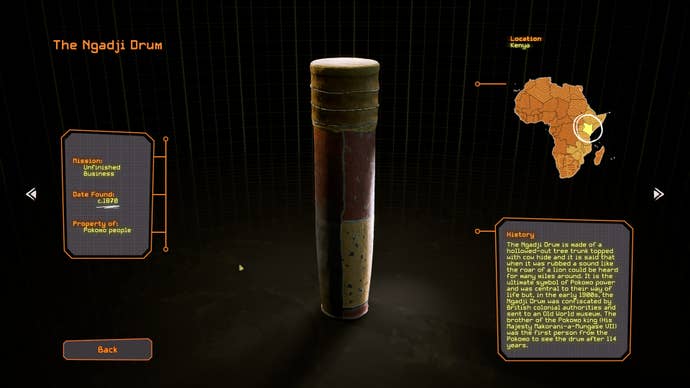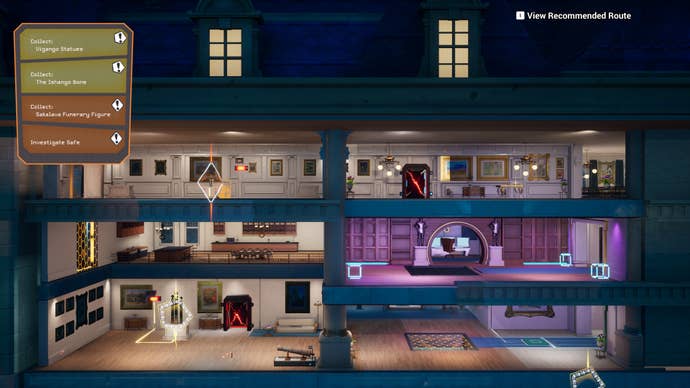Heist game Relooted takes playful, political revenge on both museums and looting sims

Room 17 of the British Museum contains an entire tomb – a two-thousand-year-old burial site framed by featureless lavenderbox walls, like an asset conjured up in a video game editor. Known as the “Nereid Monument” for the presence of sea nymphs among the pillars, it is thought to have been constructed for the Xanthian ruler Arbinas in what is now Türkiye, and appears in the Museum care of the 19th century British archaeologist Charles Fellows, who, in the Museum’s words, “brought many antiquities back to England with the full permission of the Ottoman Turkish authorities”. Modern-day Turkish repatriation organisations dispute this framing, naturally, and are campaigning for the monument’s return to the lands on which it once stood.
The British Museum is full of artefacts filched from around the globe in the course of Britain’s conquerlust. Neither that legacy of theft, nor the brazen fractal absurdity of having an entire building displayed inside another building made much impression on me, the first time I saw the Nereid Monument as a teen. I just thought that’s what museums were about: old stuff from Other Places, clinically displayed. Ben Myres, creative director of South Africa-based Nyamakop, had a different experience when he visited London in 2017 with his family.
“I went to Loading Bar, and my parents went to the British Museum,” he recalls. “We met up for dinner, and my mom was in a fit of rage because she had just seen the Nereid Monument… She was kind of overwhelmed by the audacity of it. And she said, you should make this into a game. And I thought the idea of moving a building out of another building would be really hard to make fun. So we scaled down a little bit!”
Nyamakop’s current project is Relooted. As the name suggests, it’s a looting game that turns the tables on the appropriative logics of both museums and other looting games – all those open worlders and RPGs in which you siphon Legendary-grade hats from fantastical frontierlands that are thin analogues for colonised places.
Here, you’re looting the bastards who did the looting, prising back recreations of real-life stolen artefacts from museums and private collections. Led by narrative director Mohale Mashigo, this is a reworking of the heist genre into a story about post-colonial redress, which takes place in a relatively utopian, Africanfuturist setting developed by art director and former Netflix artist Bongane Mahlangu. As regards the nuts and bolts, Relooted is a side-scrolling platformer with tactical puzzle preludes in which you must plot an escape route before swiping an object from its casement and raising the alarm.
During our hands-on at Summer Game Fest, Myres makes no bones of the awkwardness of demoing a game about imperial theft to a white European. “Oh no, the British are here!” he says, as I totter up to the booth with my notepad. He is equally unceremonious about his own heritage as a white man raised in South Africa, which makes him an odd candidate to promote a game about Black anti-colonial activists.

Nyamakop’s members – amongst them Sithe Ncube, former regional organiser for the Global Game Jam and “a bastion of the African game development scene”, as Myres comments – hail from many countries, including Lesotho, Tanzania, Zimbabwe, Ghana and Nigeria. Why are none of them here to show off the game? “I was the only one who could get a visa,” Myres says. “Unfortunately, relations between the US and South Africa are not too great right now.” As Aftermath have reported at greater length, Myres being the only team member able to attend Summer Game Fest reflects the racism of immigration laws together with the current US government’s Musky propaganda about a “white genocide” in South Africa.
Based on 20 minutes with the demo, Relooted feels like one of the puzzle-platformers that graced the launch of the original PSP, building upon the “cute-n-complicated” feel of the developers’ previous Semblance. The escape sequences are a speedrunner dash through flashing hallways, with players hitting buttons rhythmically to mantle or slide under objects. It makes me think a little of the music levels in Rayman Legends, but then I crash through a window and I’m back playing Canabalt.
Neither of these is the chief source of inspiration for Relooted’s capering. That would be Teardown, the physics-based demolition sim in which you have to stack, smash and burn your way to the prize before the alert timer elapses. As in Teardown, Relooted’s opening sections see you first roaming the premises at leisure – counting the security doors, moving props such as tables, and positioning your crew to help out during the subsequent race to the getaway van. You might ask the group’s acrobat to dangle from a ceiling so that you can swing across a gap, or have somebody tee up a motorised zipline between floors.
The heist planning is wryly reminiscent of a museum tour, and educating players about the history of each artefact is indeed a priority. During the SGF demo, the task is retrieving some grisly trophies from the estate of a private collector. One is the skull of Mangi Meli. “He was an African leader who was killed by the Germans and decapitated and taken to Germany to be phrenologically studied,” Myres explains. “And then they lost the skull, and no one knows where it is.”

The demo level also asks me to recover the remains of Prince Alemayehu. “He was an Ethiopian prince who was taken to the UK, after the UK briefly conquered Ethiopia,” Myres goes on. “He died when he was 18, and he’s buried at the grounds of Windsor Castle. The Ethiopians have asked for his body back many times.” You’ll learn about these objects in conversation with other members of your crew at your hangout between missions: I don’t get much sense of these scenes during my demo, as Myres skips through for the sake of time.
I’m very interested in Relooted’s twofold handling of time, based upon my threadbare awareness of post-colonial art and activism. The game’s planning stage makes me think a little of the Iraqi-Canadian scholar Alia Al-Saji’s account of art that may open “breathing time” for the “racialized subject”, confronted by colonial representations of the past. Before you crack the security glass, each exhibition or collection is yours to traverse indefinitely. The slickness and flurry of each race to the exit, meanwhile, feels like giddy relief for repatriation groups who are accustomed to purgatorial wrangles with institutions that, notwithstanding their candour about their colonial heritage, stubbornly continue to profit from the display of plunder.
Nyamakop have declined to engage much with these institutions while developing the game, partly because immigration laws make it so hard for the developers to actually see their stolen cultural heritage up close, and partly because they feel it’s a waste of energy. “There are definitely examples where artifacts have been repatriated, but there’s a long history with a lot of artifacts in this game of requests being denied to be repatriated,” Myres says. “So we haven’t really bothered much, to be honest.”






![Best Games Like Jackbox Party [2025 Game List] Best Games Like Jackbox Party [2025 Game List]](https://i0.wp.com/www.gamingscan.com/wp-content/uploads/2022/12/jackbox-party-pack-9.jpg?w=1024&resize=1024,1024&ssl=1)





